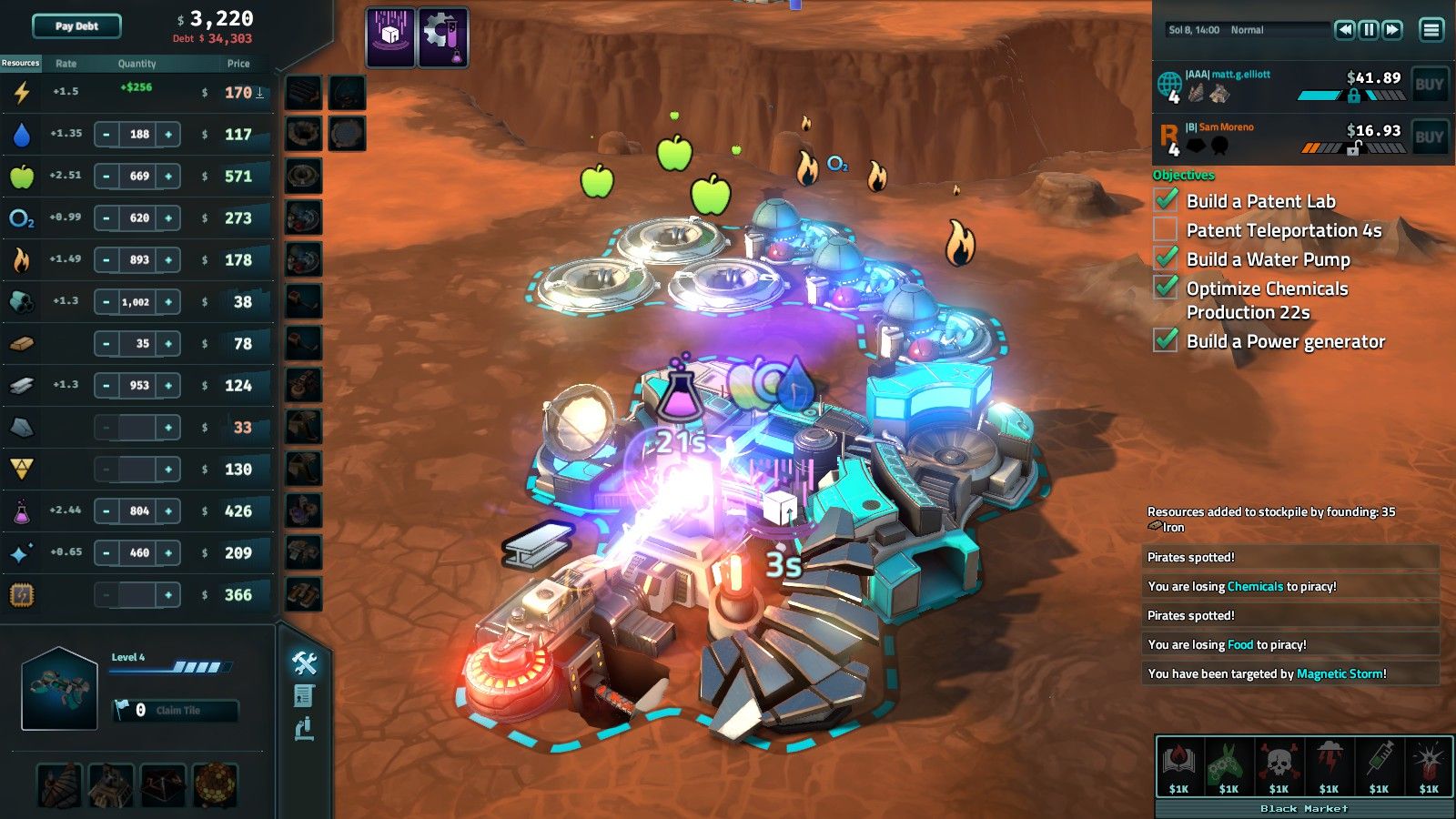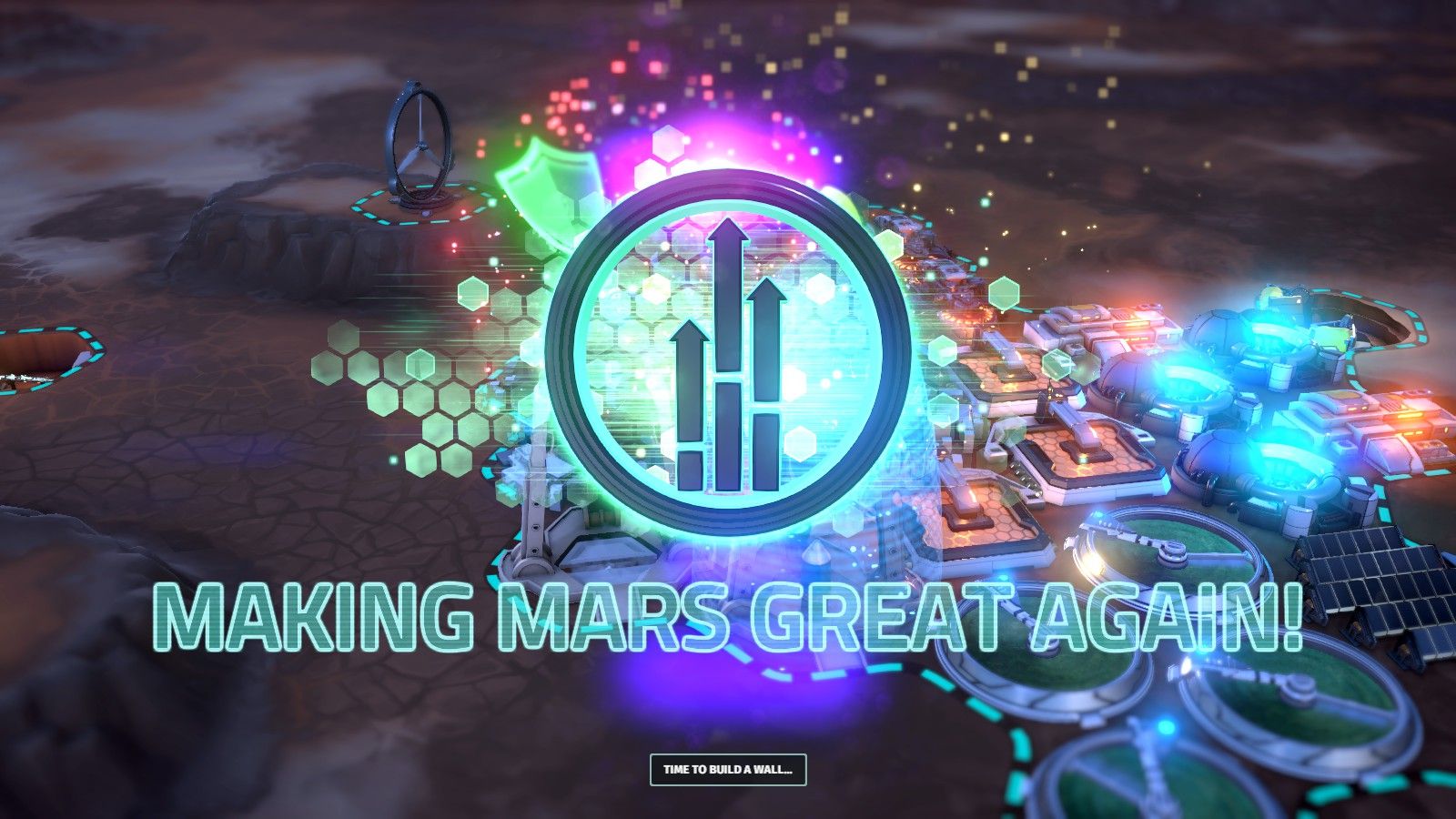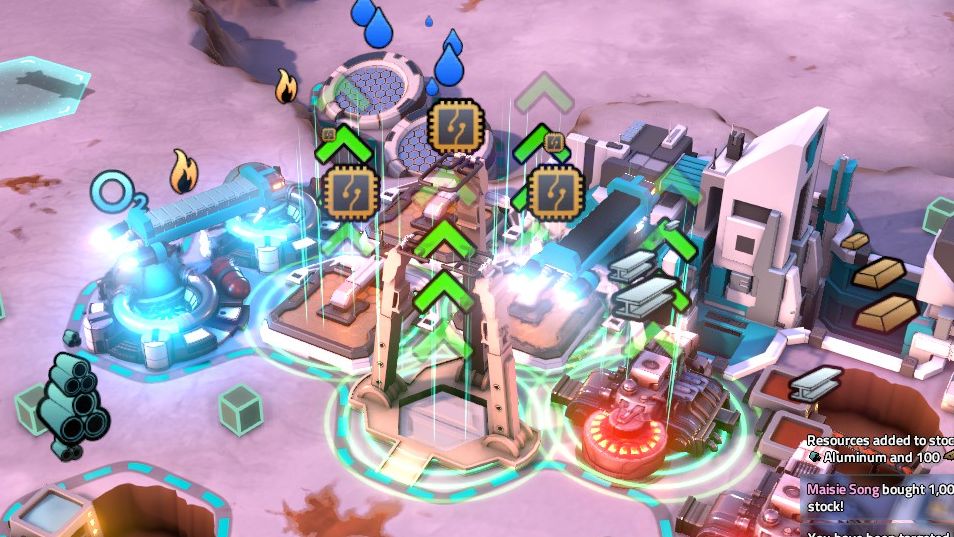Our Verdict
Master its complex systems and Offworld Trading Company is ruthless, immediate and thoroughly rewarding.
PC Gamer's got your back
Most people assume Mars is red, but it’s not. It’s actually a genteel shade of beige. As well as being a tolerable pub fact, that provides a helpful contrast with the bright, vicious and exciting thrust of Offworld Trading Company, where the only colour that truly matters is green.
It’s a strategy and management sim based on the beige planet. You take control of one of four factions, founding a business dedicated to supplying new human colonies. Your company requires essentials such as food, water and power, and you can mine metals and quarry chemical elements. These resources are then used to create valuable secondary materials such as glass, chemicals and electronics. Every resource has a fluctuating cost, and it’s your job to play the market, manipulate prices and ultimately put your rivals out of business. That might sound like work—or worse yet, like something an awful investment wank with four phones attached to his face would love—but it’s one of the most immediate, intelligent strategy games I’ve played.
You have to watch what other factions overproduce, then exploit them. If your opponent is has a surplus of water, the price will drop and you can invest in farms, producing food you can sell at inflated price. This is the foundation of Offworld Trading Company, and the thing that initially took me a while to understand. Building every type of building is rarely an option. You have a limited number of claims, and only ever control part of the market. You’ll inevitably have to skip some resources and rely on your opponents for certain essentials, but it’s coexistence, not cooperation.
Offworld Trading Company is a savage game, as immediate and competitive as Street Fighter. The slightly depressing revelation is that our chief human exports to Mars are capitalism and an endless capacity for consuming each other. There are no tanks or troops, though. Your weapons are price fixing and corporate espionage. Your ultimate goal isn’t to destroy your opponent, but absorb them via hostile takeover. It’s different from more leisurely strategy games in that it’s short form—games can be over at any stage, resources allowing—and if you just feel like laying back and colonising Mars, you’ll simply get devoured. This isn’t an RTS with the combat removed - it’s Wall Street on a new frontier. It kept me engaged because every choice is part of an ongoing battle. It’s impressive that a pillar of fluctuating numbers can be so captivating.

It’s a tricky thing to describe, let alone play, but thankfully there are some rugged tutorials to ease you in. They expertly explain the basics like price fluctuation, patents and buying shares in your opponent, to more nefarious practises such as price gouging and market manipulation. It feels like there’s loads to learn—managing hostile takeovers, protecting stock and using the black market—but Offworld Trading Company does an elegant job to gently teaching you how everything works.
The campaign is an extension of the tutorial, and it offers a different way to compete. There are nine CEOs from different companies, each with their own identity and limitations. You’ll have to invest money in engineers to build certain advanced structures, and every challenge is different. It forces you to play to each faction's strengths over a limited period of time, and it’s replayable in the same way as something like FTL: a self-contained, three hour story that’s different every time. Many of the games I played came down to desperate, last-minute purchases of shares, racing to sell enough stock before the final buzzer. It’s fun, but somehow less rewarding than a skirmish without limitations.
Truthfully, ‘skirmish’ doesn’t do the competitive game justice. It’s built on a system that’s endlessly evolving, reactive and intimidatingly smart. No two games play the same, and it’s only predictable in an abstract sense. You know that certain advanced goods generally sell at higher prices, but the circumstances leading to that point change in every game. It demands a level of agility I’m unused to in strategy games, and that’s exactly what makes it exhilarating. The sterile roshambo of simpler titles is almost completely absent here. No single tactic will effortlessly sweep you to victory. Spears don’t always beat cavalry. To go back to that useful fighting game analogy, it’s like a game of Street Fighter in which your opponent changes every three seconds.
The advanced structures you can build only add to this sense of a shifting, malleable financial environment. Once your company is set up, you can create game-changing buildings such as hacker arrays which can be used to skew prices, or offworld markets which let you export your goods at a vastly inflated rate. These buildings are powerful enough to change a game, but require significant time and investment, and often require a range of resources outside your reach. The results are worth it, though. If you're losing goods because of piracy, for example, you can patent teleportation to replace your transports and bypass them. Best of all, once you’ve done so, nobody else can use it. It adds another welcome layer of complexity to an already nuanced game.

You have to protect these buildings. Each game applies offers you a selection of random black market effects. These include simple things like goon squads, which shield your structures from corporate espionage, to holograms which can cloak your most precious investments, hiding them from the illicit attention of your rivals. Used correctly, these are an essential part of controlling your opponent’s resource flow, and the only way you can directly affect them, but they come with an inherent risk. If you cause a mutiny at their offworld market, you can temporarily reap the benefits without the cost or investment. Get caught doing it, however, and you’ll lose the money you spent on the mutiny, and you’ll have to wait for the cooldown on the black market abilities. Like everything in Offworld Trading Company, there’s no simple, one-shot solution which always works. It’s a pleasing gamble, and the only wrong choice is the one that fails.
It’s handsomely presented, too. The tone is satisfyingly bleak throughout, especially when dealing with weary, cynical Yoshimi robot faction. Christopher Tin’s score brings a game about numbers to life, channeling the hopeful thrum of Tangerine Dream one moment, and urgency of Philip Glass the next. It’s affecting, alien, wonderful.
Offworld Trading Company is a difficult game to review because I’m probably not good enough to enjoy it the way I should. It says plenty about about the game, then, that I still completely love it. There’s a simple, tactile joy of seeing every a nudge of the finger explode into a flourish of numbers, but a deep and lasting satisfaction from knowing every profit was carefully engineered.
Master its complex systems and Offworld Trading Company is ruthless, immediate and thoroughly rewarding.


